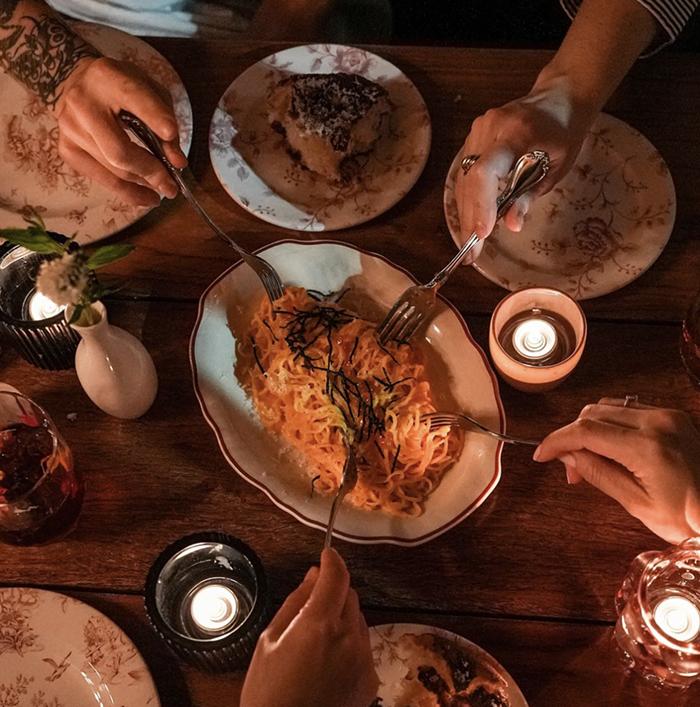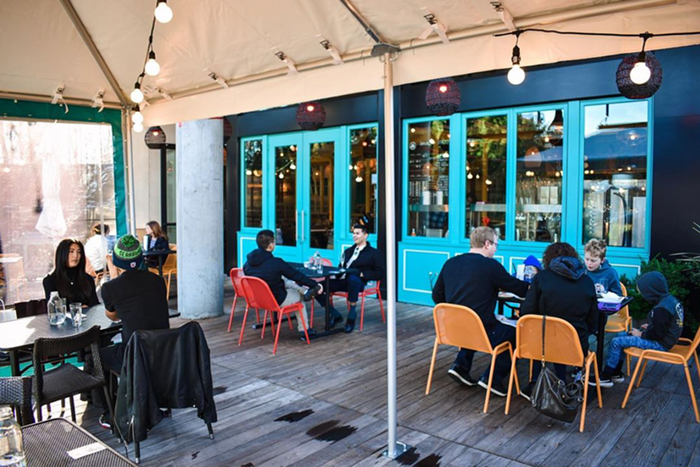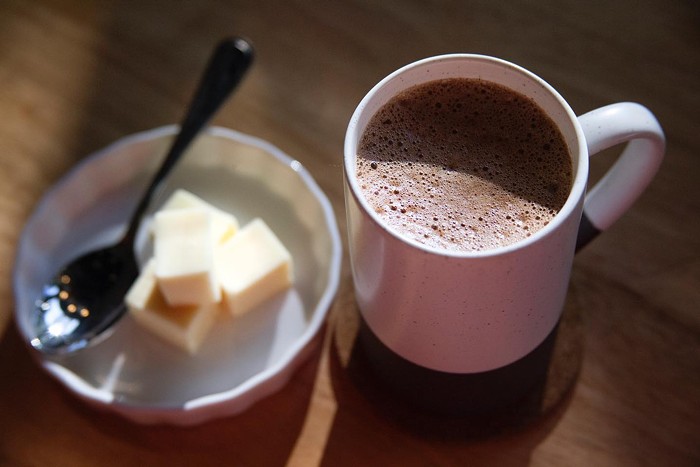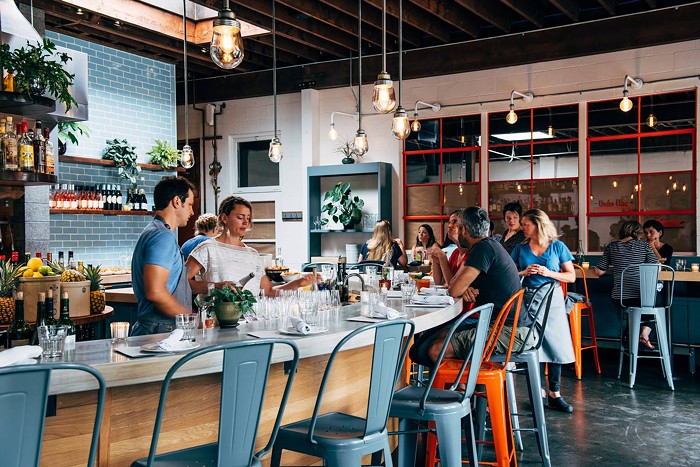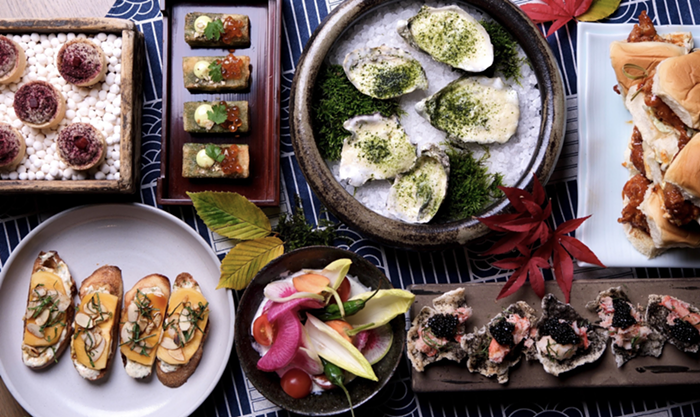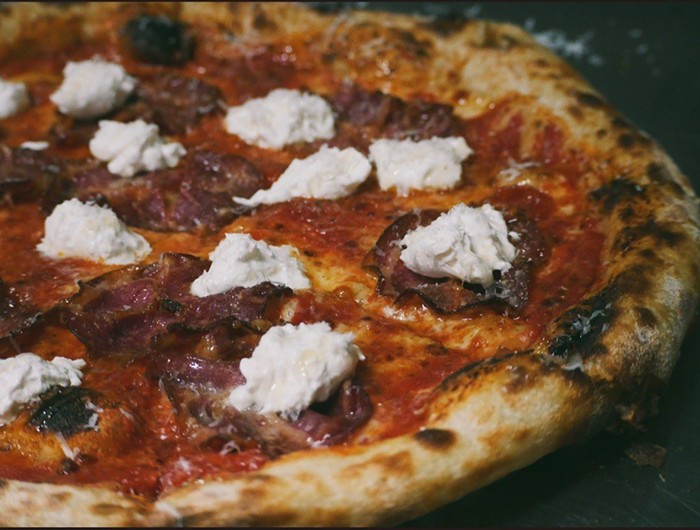
When I weaseled my way into last night's 12-course Edouardo Jordan dinner hosted by Vice and Delta, part of their week-long Launchpad series of food events at the former Restaurant Zoe, I didn't expect much beyond some really good food. I figured Jordan was there to get his airline money, hype JuneBaby a bit, and call it a night. I expected to maybe meet the man, shake hands, ask a couple questions, and hopefully get more acquainted with his cooking. I don't make it up to Ravenna much anymore, and we've already written plenty about both of his restaurants.
What I was not expecting him to do was turn the twelve courses into a vibrant, delicious retelling of his personal culinary journey, complete with effusive tableside narration. Each of the twelve courses was tied into a stop along his road to the stardom he is currently enjoying, creating a scintillatingly beautiful spread and couching it in some pretty damn rich emotional context.
It might sound like some spirit crystal shit, but I think you enjoy food more when you have a certain feeling about it, so eating a little amuse-bouche of scrambled egg and uni on sourdough toast—made in honor of the first meal he made for his mother—was extra awesome.
"By no means was this meal perfect," he told us, laughing. "But my mom told me it was perfect."
That bite came alongside a dark cornbread with duck gizzards and a pork croquette that, as I gushingly told Jordan later, was easily one of the best things I've ever eaten, being infused in the center with his beautiful, tangy barbecue sauce, breaded, and fried to a precisely perfect crisp. Both were an homage to his grandmother's cooking, the croquette being linked to her loving preparation of barbecue meat and the cornbread being a play on her signature Thanksgiving dish.
After that, we left home and set off on the first steps of his culinary career, which was where I really started to understand everything that went into Jordan's seemingly meteoric rise. "Seemingly" being the key word—his stardom is built on years of diligent, dedicated labor and a genuine obsession with his craft.
I was particularly taken with the story of his salad, which was born out of his time at Le Cordon Blue in Florida. He'd gone back to culinary school after getting his bachelor's from the University of Florida and pursuing an unfulfilling career in sports management, and found himself far more motivated than his younger classmates.
"Here I am, at the top of my class, getting all these honors. But I needed more challenges while I was there. So I connected with a few instructors, and one of them was Chef Tony Adams. He gave me this Iron Chef challenge like, 'Here are some ingredients, make something of it.' There were only three ingredients: Bibb lettuce, apple, and an onion. And he’s like, 'Make something of it.'
I thought I made this real sweet, gangster-ass salad. It was raw apples and Bibb lettuce, stacked on top of each other, this heavy salad. With pickled onions. And he took those ingredients, and was like, 'No this is how you do it.' He carved the lettuces up, made the pickled onions a bit sweeter, and poached the apple and made some beautiful diced apples. He stacked all the ingredients so that it was almost as if they were dancing on that plate. And that’s when I realized I had a lot more to learn, and realized I need to regroup and figure out, 'How do I take this seriously?' I wanted to work in food and wanted to work with the best.
While he explained all this, we noshed on the exact salad he was describing, perfectly poached apples and all. It was interesting to eat something that, for him, symbolized his hunger to succeed, and to have the dish itself succeed. That hunger, in fact, quickly emerged as the unifying theme of the dinner. His story about how he got to the French Laundry, and later the Herbfarm, delivered with a beautiful medley of foraged mushrooms with fiddlehead ferns and aioli, was illustrative of just how dogged he's been about his cooking career:
"From a suggestion from some of my culinary instructors and directors, they encouraged me to go read books at the library, all the books. So one of those books I discovered was the French Laundry’s cookbook. I started flipping through the pages, and it felt like it was in Spanish or something, like, 'What is a torchon? What is a demi-glace? What is this three-day braise wrapped in a bag?' I thought, wow, this is overwhelming. But in that moment, I realized those are the kind of people I need to be cooking with, and that’s the environment I need to be cooking in, if I want to be the best in the industry. I take everything I do very seriously, and this was an extension of that.
So I read the book, the entire book, and I thought, 'I need to be there.' I sent off emails, talked to a lot of people, and never got a response. I didn’t know what to do, I graduated, was working in Tampa, Florida, and I decided to just go to California. At that moment I was very serious about food, so I just went off and took that risk. I knew I wasn’t going to end up at the French Laundry right away, but I made it my mission to take strategic steps to get there. At one point, I thought, “maybe I’ll just go there and wave at someone until I get their attention.” I met the Executive Sous Chef at that moment, sent him my resume and got my internship there a week later."
French Laundry was a crazy experience—there was this constant sense of urgency, and a super intense sense of perfection and finesse. Everything was touched and manipulated very carefully. That was a struggle at first, but I slowly caught on. I was cooking with the best chefs in the world[...]. I was so stoked to just be there, soaking it all in at a young age. I was there for six months, I worked for free. That was my internship, my stage, my commitment to my career. When it was over, I realized that while I had that momentum I just had to keep going, I couldn’t stop. So I ended up landing a job in Woodinville at The Herbfarm. I learned a tremendous amount from Jerry Traunfeld. It was a completely new experience and it was my introduction to PNW cuisine—farming, foraging, preserving, local sustainability—all these things that are still rooted in me today."
On the subject of being rooted, his chosen hashtag for Salare's social efforts is #FoodWithRoots, and I think I get it now. He opened Salare first, knowing that, as a black chef, he'd be pigeonholed into "ethnic" cuisine if he did a Southern restaurant. JuneBaby could only come after, when he'd already established himself. I can see how people might think his hashtag is about those Southern roots, but after eating his twelve courses, I think it's about more than that. It's about his chef roots.
One thing is obvious, from both his food and his story: the man cares a whole fucking lot about cooking. It is not a career he fell into casually. It's something he strove for. Much is made of him being a black chef, and it is indeed refreshing to see someone shaking up the white guy formula of food stardom, but he is first and foremost a chef. And judging from the food we had, he's one of our city's best ones.
Launchpad's last two events are tonight—a workshop on opening your own food truck and a talk about women in farming with Mold Magazine founder LinYee Yuan—and I'd encourage you to go. I sat next to LinYee, and besides exchanging about a billion holy-shit-this-is-so-good-I'm-not-imagining-this-am-I looks, I got to chat with her a bit about her talk. Smart lady. You can RSVP here, or just walk by and see if they still have spots open.
Isobel Press contributed reporting to this story.
